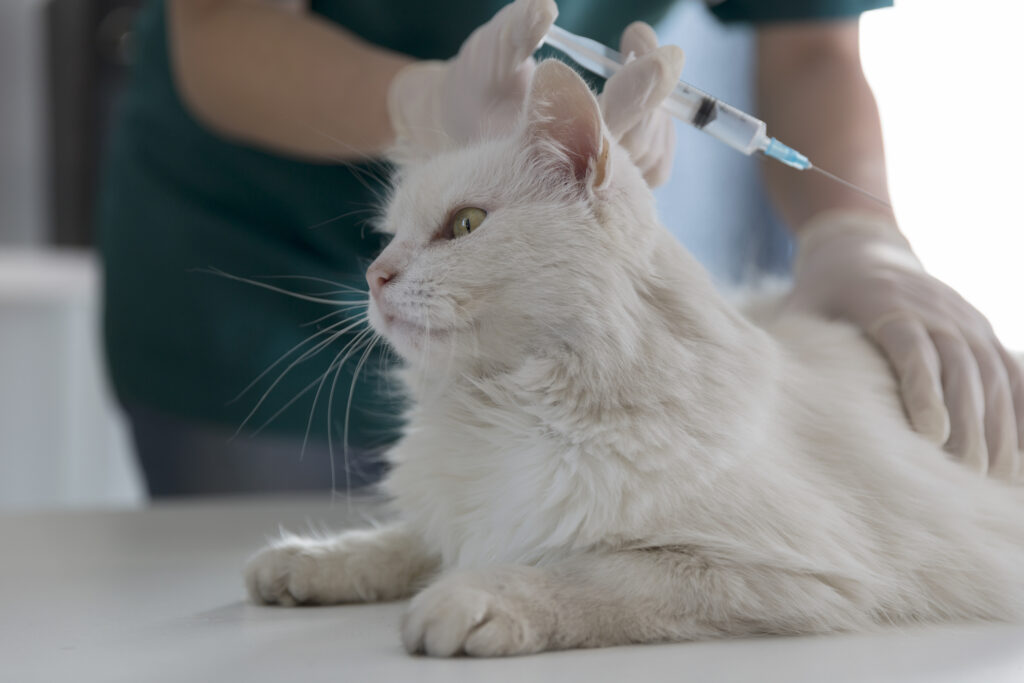As a cat owner, it’s important for you to learn everything you can about providing the proper vaccinations for your pet. Feline vaccinations may be slightly different from canine shots, and if this is your first time owning a cat, it’s even more necessary for you to learn and educate yourself on vaccinations for your feline friend.
In our Colorado Springs, CO, animal hospital‘s article, you’ll find a quick list of some of the most important vaccinations to consider for your cat. As always, talk to your vet for more information and if you have any questions about your cat’s health and wellness.
Feline Panleukopenia
Feline panleukopenia is very similar to parvovirus in dogs. It can exist in an environment for up to a year and is extremely hard to get rid of. Infected cats shed this virus in their feces, and it can be easily picked up on shoes, clothes, food dishes, and more.
While kittens are most likely to die from this condition, any cat who is unvaccinated against it can contract FLPV. This virus causes leakage from the eyes, frequent secondary infections, and severe dehydration. Its severity along with its contagious nature make this disease a core vaccination requirement for cats.
Feline Viral Rhinotracheitis
Feline viral rhinotracheitis is caused by feline herpes virus type 1. Although it is a herpes virus, and humans can also contract herpes viruses, feline herpes is not contagious to humans (or vice-versa). This virus causes severe upper respiratory infections that can be fatal in kittens and young adult cats, and it also causes inflammation of the eyes.
While most cats will recover from this condition (apart from young kittens), it may sometimes cause long-term breathing and vision complications in certain cats. Therefore, it is another core requirement among feline vaccinations and should not be skipped.
Feline Calicivirus
Feline calicivirus may not always be a core required vaccine for cats, depending on where you live, but it is typically still recommended. Calicivirus causes upper respiratory infections and can also be a major cause of dental disease in cats as well.
One of the most common symptoms of calicivirus in cats is nasal and eye discharge. Ulcers on the gums and tongue may also be commonly seen in affected cats. In young kittens, this condition can cause lameness in the back legs and may sometimes be fatal. Older cats typically can recover from this condition, although it can be difficult and painful.
Feline Leukemia
Feline leukemia is one of the most well-known deadly diseases that can affect cats. Despite its fatality and severity, it is not usually a required vaccination, but is instead an optional one. Most vets strongly recommend having your cat vaccinated against feline leukemia even if you keep her indoors all the time and have no other pets.
Feline leukemia may sometimes leave infected cats asymptomatic for a long while. However, when symptoms occur, cats typically will die within three years. This condition causes severe weight loss, frequent fever, mouth inflammation, and many secondary infections. There is no treatment or cure for it.
Feline Chlamydiosis
Feline chlamydiosis is very common in cats who have recently come from a shelter or rescue, or cats who have stayed in a boarding facility recently. It causes sneezing, watery eyes, and a runny nose, and it may also sometimes cause a fever in certain cats, too.
Although it is mostly an eye condition, feline chlamydiosis may also cause other respiratory problems. This condition can be treated with a round or two of antibiotics, but it can also be prevented entirely by having your cat vaccinated against it. This is not a core vaccine but is still recommended.
Rabies
Rabies is a core required vaccine for cats and dogs alike. This vaccine is legally required throughout the United States and many other countries as well, and it will be required before your cat can travel or be boarded anywhere, too. Rabies is extremely contagious and is always fatal, and it can be transmitted to humans through a bite.
By the time rabies symptoms develop, it’s already too late for cats to be treated. The only course of action is humane euthanasia before the disease progresses. By having your cat vaccinated against rabies, you can prevent this tragic outcome.
Our Colorado Springs, CO, Animal Hospital Has the Vaccines Your Cat Needs
Vaccinations are an important part of cat ownership, just like they are for dogs and other types of pets as well. By keeping up with your cat’s vaccination requirements, you can provide a healthier and happier environment for her throughout her life.
If you’re concerned about giving your cat her vaccinations, talk to our Colorado Springs, CO, vets. We can help you choose which shots are necessary for your cat, which ones you may be able to skip, and which—if any—may be a cause for concern for your pet.
To schedule your cat’s vaccinations appointment, give our animal hospital a call at (719) 475-1314.





